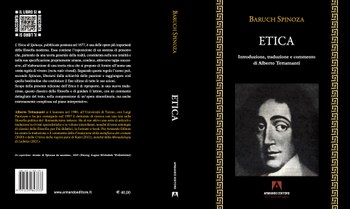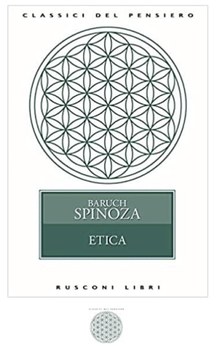Translating affects: two translations of Ethics compared
Two recent Italian translations of Spinoza's Ethics: Diego Donna and Alberto Tettamanti discuss textual choices and decisions regarding "affections". Coordinated by Lorenzo Vinciguerra
-
Date: 21 MARCH 2023 from 9:00 to 11:00
-
Event location: AULA II Piano Primo Palazzo Riario Scarselli Via Zamboni, 38 - Bologna - In presence and online event
-
Type: Spinoza-and-Philosophies

Alberto Tettamanti:
"I adhered to the criterion of maximum fidelity to the letter of the text, because philological rigor is a must in the translation of a philosophical text and, even more so, of a text such as Spinoza's Ethics. I used the utmost care in translation of technical terms, which must be translated literally and unambiguously, because Spinoza understands them in a single meaning.Many other terms, however, are understood by Spinoza in a different meaning from the one usually attributed to them. in fact, he intends to explain not "the meaning of words", but "the nature of things", and to this end he uses terms whose meaning does not always coincide with what one is used to associating with them. to avoid, in translation, is the literal transposition of the Latin term into the corresponding Italian term. For example, the term depositium should not be translated with "desire", but with "regret", because this is the meaning or which Spinoza ascribes to it".
Alberto Tettamanti graduated in 1980 from the University of Turin with Luigi Pareyson, with a thesis on Adam Müller and the theory of knowledge of Frühromantik. He continued his studies in Germany as a fellow of the Robert E. Schmidt-Stiftung at the University of Freiburg i. Br. and Heidelberg. In 1987 he obtained his PhD at the University of Turin with a thesis on the political philosophy of German Romanticism. He was later a professor of history and philosophy in the classical and scientific high schools of Modena and Bologna. He has published a series of articles in specialized journals and miscellaneous volumes, as well as some anthologies of classics of philosophy, for educational purposes, in e-book format. For Armando Editore he edited the edition, with translation and commentary, of the Foundation of the metaphysics of customs (2020) and of the Critique of pure reason. An anthology (2021) of Kant, of Leibniz's Monadology (2021) and of Spinoza's Ethics (2022). An anthological edition of Pascal's Thoughts is currently being printed by Armando Editore.

Diego Donna:
"The Ethics is a work without a name by the will of its author who decided not to deliver it to the press, thus escaping the "hatred of theologians" and chose to write not for the glory of men but for the eternity of the mind. A philosophy without a subject, the very form of the infinite and a profession of philosophical life, adequate to the order of causes or to the absolute power of reality.This translation of the Ethics takes into account the comparison of the most recent textual lessons in view of a choice that combines the philosophical significance of the original terms and their intelligibility for today's reader.To help the reader in researching and understanding the single themes, it was decided to accompany the translation of the five parts of the Ethics with a synthesis of the main theoretical cores covered in each of them.The apparatus of notes in turn contains essential information about the translation choices made and the philosophical, historical and literary sources with which it compares nt the Spinoza project."
Diego Donna is a fixed-term researcher type b) (senior) at the Department of Philosophy and Communication of the University of Bologna. He deals with the history of modern and contemporary philosophy. Among his publications: Contre Spinoza. Critique, système et métamorphoses au siècle des Lumières, Genève, Georg, 2021; Dispersion Order Distance. Foucault's Enlightenment Luhmann Blumenberg, Macerata, Quodlibet, 2020; Libertas Philosophandi. Freedom of Expression Conscience and Thought in Modern Philosophy, Modena, Mucchi, 2020; Norm, sign, authority. Political Theology Philosophy in Spinoza, Bologna, BUP, 2019; The chains of reasons and the order of nature. Theories of knowledge in Descartes and Spinoza, Milan, Mimesis, 2015.